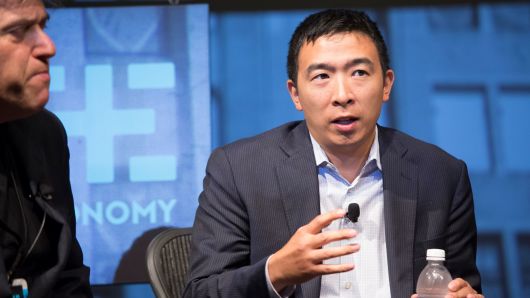US presidential hopeful: Free money can help save the country from jobs lost to robots
11 September, 2018

Entrepreneur Andrew Yang is running for U.S. president, and he's made the robot revolution a central pillar of his election campaign for the 2020 race.
Yang is the founder of Venture for America, a nonprofit that helps entrepreneurs create jobs, and he was previously the CEO of education firm Manhattan Prep. A Democrat, he has said the rise of automation and artificial intelligence will soon render millions of American jobs obsolete. To prevent widespread unemployment, he's proposing monthly stipends of $1,000 for all citizens aged 18 to 64, no strings attached.
With a third of American workers at risk of permanent unemployment from new technologies in the next 12 years, "we have to accelerate both American society and the government to help manage this transition," he told CNBC's Akiko Fujita on the sidelines of the CLSA Investors' Forum in Hong Kong.
The theory is that such payouts would create 4.5 million jobs by channeling more consumer spending power into the economy and fuel mainstream businesses, he projected, citing estimates from The Roosevelt Institute. "By implementing this, you also strengthen the consumer market which businesses need, this is essential for capitalism to continue in its current form," he said.
To pay for the monthly handouts, the 43 year-old is proposing a 10 percent value-added tax on corporations that he says will generate $800 billion in new revenue.
While President Donald Trump wants to bring jobs back to American shores, Yang simply doesn't believe those jobs are coming back. Trump won because the country "automated away four million manufacturing jobs" in areas like Michigan, Wisconsin and Pennsylvania, according to Yang, a trained corporate lawyer who announced his candidacy earlier this year.
The idea of governments providing regular allotments of free cash to people is known as universal basic income, and it's been championed by a number of prominent economists and politicians that include Milton Friedman, Bernie Sanders and Dr. Martin Luther King Jr.
Finland has been experimenting with the policy since January 2017 while tech executives such as Elon Musk and Mark Zuckerberg have expressed support for the concept. But critics say universal basic income will likely lead to inflating state deficits and reduce incentives for people to work.
Yang, however, maintained that $1,000 is the "sweet spot" because "it's high enough to be very impactful on American households and families but it's not so high that it will push people out of the labor market."
Citizens already receiving government benefits would have to choose between existing welfare or the $1,000 monthly payments, according to Yang's policy. Seniors, meanwhile, would not be eligible for the program and would continue to collect Social Security.
